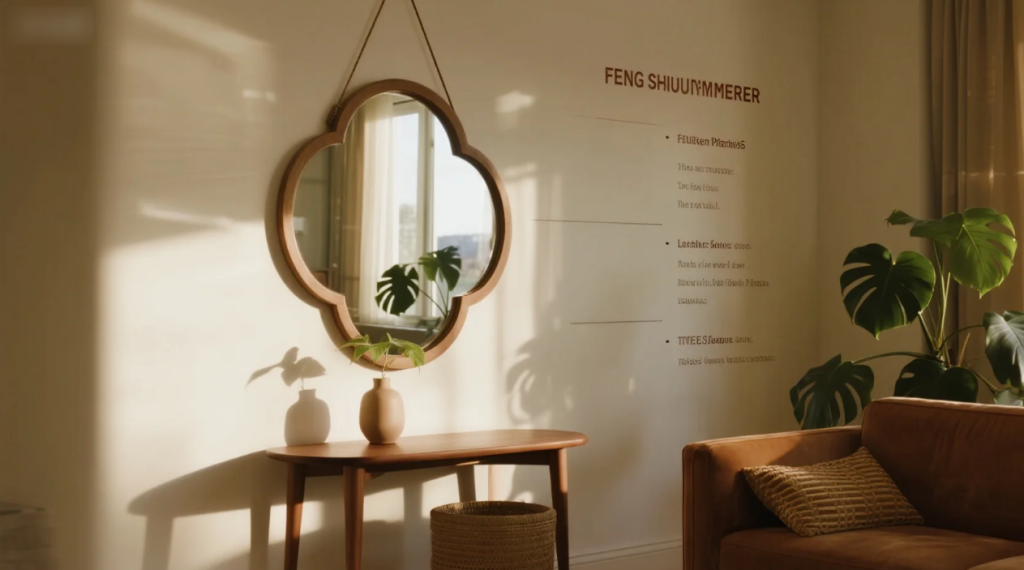Feng Shui is more than just arranging furniture. It’s about directing energy, or Chi, to create a space that nurtures well-being. One powerful yet misunderstood tool is the mirror. This guide explores 38 essential Feng Shui mirror placement for good luck principles. We’ll also bust five widespread myths you might be falling for.

What’s the Real Purpose of a Feng Shui Mirror?
Let’s clear this up first: mirrors reflect images, not energy. While they influence Chi flow, they don’t store or amplify energy like some believe. Think of them as tools to manipulate space and light, not magical relics.
A Feng Shui mirror placement for good luck depends heavily on what it reflects—not just where it’s mounted.
1. Best Shapes and Materials for Feng Shui Mirrors
You might wonder, does the shape matter? Not really. Whether it’s round, square, or octagonal, choose a design that fits your décor. However, in Five Element Theory:
- Round mirrors = Metal element
- Square mirrors = Earth element
It’s not crucial, but it helps to be aware. What truly matters is what the mirror reflects and where it sits.
2. Common Feng Shui Mirror Placement Mistakes in the Kitchen
Avoid mirrors near stoves. The stove symbolizes fire, and mirrors double that energy. This imbalance may increase restlessness or even family tension. A mirror behind the stove? Definitely a no-go.
Example: One homeowner placed a mirror behind her stove thinking it would “double abundance.” Instead, she experienced constant arguments and stress in the kitchen.
3. Feng Shui Mirrors and Bathroom Rules
The bathroom already holds draining energy. So, where does a mirror belong?
- Never place a mirror opposite or facing the toilet
- Avoid mirrors opposite the bathroom door
- Best placement: above the sink (but not facing out)
Interesting case: A client hung a mirror opposite the bathroom door. Soon after, guests started avoiding that hallway. The fix? Relocate the mirror—problem solved.
4. Can Mirrors Face the Main Door?
It might seem logical to place a mirror across from your main entrance to “bounce energy back.” But actually, it may deflect good Chi away.
Instead: Place the mirror on a side wall, perpendicular to the front door. That way, you welcome energy rather than repel it.
Note: A brass mirror here (metal creating water) can enhance wealth energy.
5. Feng Shui Mirror in Bedroom – Yes or No?
Can you have a mirror in the bedroom? Yes, but with limits. Avoid positioning it where it reflects you in bed. This can disturb your subconscious during sleep.
Pro tip: Cover mirrors or reflective TVs at night with a cloth to aid deeper rest.
Myth busted: No, a mirror doesn’t invite marital affairs. It just disturbs sleep if badly placed.
6. Ideal Feng Shui Mirror Placement for Dining Room
Mirrors in the dining room can enhance abundance, but avoid watching yourself eat.
- Place beside the table, not directly facing it
- Reflect décor, not diners
- Avoid windows or cluttered spaces
Case study: A family saw more harmony after they shifted their mirror to reflect a flower vase instead of their plates.
7. Using Mirrors in Living Rooms and Entryways
Entryways are Bright Halls in Feng Shui—let them shine! A well-placed mirror can brighten and energize the space.
- Avoid mirrors that reflect clutter
- Reflect natural light or beauty (e.g., a painting)
- Never face it directly toward another mirror or screen
Scenario: A mirror bouncing TV light across the room created visual chaos. Moving it slightly transformed the room’s feel.
8. Stairs and Mirrors: A Delicate Balance
Mirrors near stairs need careful planning.
- Avoid mirrors facing staircases (up or down)
- You can place one on the stairwell landing
- Never let it reflect partial bodies—this symbolizes incompleteness
Safety tip: Unexpected reflections near stairs can cause confusion or imbalance, especially in dim lighting.
9. Feng Shui Mirror Placement in Home Offices
Working from home? Avoid mirrors behind your desk—they can “double” your workload and stress.
Exception: If a wealth corner exists, use a mirror to reflect symbols of prosperity like a money plant.
Curious fact: A small mirror reflecting coins or a lucky symbol can reinforce positive mindset during work hours.
10. Bagua Mirrors: Do They Belong Indoors?
Short answer: No. Bagua mirrors are for exterior use only.
- Flat Bagua mirrors: neutral, reflect images
- Convex mirrors: deflect energy outward
- Concave mirrors: absorb and neutralize negative energy
Use case: A concave mirror near a hospital entrance helped a family reduce emotional strain inside their home.
However, never use convex mirrors in residential areas—they can harm neighborly relations.
Final Thoughts: Feng Shui Mirrors Are Tools, Not Magic
To get the most from Feng Shui mirror placement for good luck, follow the basics:
- Reflect beauty and light
- Avoid facing doors, beds, and toilets
- Use mirrors to open up space, not create confusion
Feng Shui isn’t about superstition. It’s a system built on centuries of observing how energy affects life. By applying these mirror placement principles with intention, your home can truly become a magnet for peace, prosperity, and harmony.
